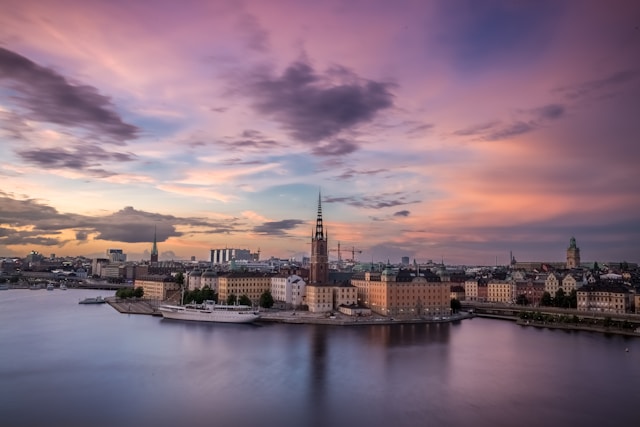As iron sharpens iron, so one man sharpens another.
Proverbs 27:17

Image kindly provided by https://unsplash.com/@raphaeldas
The art of travel is only a branch of the art of thinking
Mary Wollstonecraft
On Travel Writing
I awoke early; that time
when thoughts rush in and fill the senses with sharp anxiety. It was June 24,
the Ayrshire forecast of sunshine and dark cloud reflected the conflicting mood
of the nation. ‘The British people have voted to leave the European Union, and
their will must be respected.’ The politician’s carefully written statement
sent shock waves throughout Europe. It was like living in a village after the
Vikings had raided.
A film emerged, a captured memory in time that took me back to July 1995 and a sleepy little village tucked away in the small commune of Målsryd. A Swedish girl who had been my daughter’s pen-pal since youth, visited us in ‘94 and her family wished to reciprocate the hospitality. I never needed much persuasion to accept. I was fourteen when I first fell for the country. The influence of my teacher who painted images alongside the music of Sibelius and Grieg created a love affair with a mistress I never met. Unlike the poet, Yeats, I am not rooted in this ‘perpetual place’ where I grew up. No, Scandinavia affected me in such a way that it felt like my proper home; an emotion the Germans call fernweh, the strange and paradoxical longing for a place never visited.
So, we spent the year learning Swedish and on July 16, before sunrise, we packed up the Ford Granada with the usual tartan kitsch; a tin of shortbread, Tartan Special Ale, placemats, and a bottle of Laphroaig and made our way to the North Shields Ocean Terminal to board the Princess of Scandinavia for the overnight journey with a plan to stay a few days with Elisabeth’s family and then tour the country, including Stockholm.
Our onboard cabin was the size of a box room with four bunks. After some negotiating, my wife and I had the lower bunks whilst my son and daughter slept on top. We then set out to survey the vast vessel with a sense of excitement and finally to emerge on the top deck to watch the North-East coastline disappear in the wake.
The family went to explore the shop while I retired to a cosy corner in the sitting area to get more sense of the culture by reading Ingmar Bergman’s, The Magic Lantern.
Some of the Swedes looked eager to communicate. A look, a smile, a nod. I hadn’t been this popular since my adopted family received me back in ‘56. Likely they were suffering from vemod; a pensive melancholy triggered, on this occasion, by post-vacation blues. By clinging to a Brit, they were prolonging the adventure like a nicotine addict has that ‘last’ cigarette.
Collective roars emerged from the lounge. Sweden was beating Bulgaria in the FIFA World Cup. The mood among the Swedes was one of… well, overlyckliga (overjoyed). Swedes are characterised by the social mores of lagome (not too much, not too little). Overjoyed in their culture would amount to a subdued euphoria as no one dare stand out in the crowd. Myth reports that lagome originated from the Vikings. The celebratory horn filled with mead would be passed around and partook in such a way that every Norseman took only his fair share. Lagome presses in on modern culture and dictates that no one dare overdo it. Unlike the Midwestern Swedes in Garrison Keillor’s Prairie Home Companion who see their women as strong, men handsome and children, above average, the fatherland natives modestly bottle such pretentiousness as they would a jar of lingonberry preserve. I feel a deep respect for such modesty in a world where positive values are on a downhill piste.
I wondered if we, raised in the second city of the empire, would have traits that would appear strange to Swedes. As a child, my mother would step on a bus, lay her shopping down, turn to everyone on the bus and sigh, saying, ‘that’s been me all day’. Immediately, a conversation would begin, with strangers participating enthusiastically, behaviour that would make Swedes freeze with social anxiety, I’m assured. I wonder with my confident extroversion if I can irritate foreigners in the same way a loud tourist at the breakfast table in a Highland B & B can vex me. It was time for self-reflection. Other cultures teach us who we are. Their characteristics, like a raised mirror, help us compare ourselves, our values, albeit we look through the glass darkly.
Writing: © 2024 Jim McCrory
Comments
New comment
Hi Jim,
I found your post very interesting. I was able to have a bit of an insight into the Swedish culture. Thank you.
Gill
New comment
Thanks, Gill.